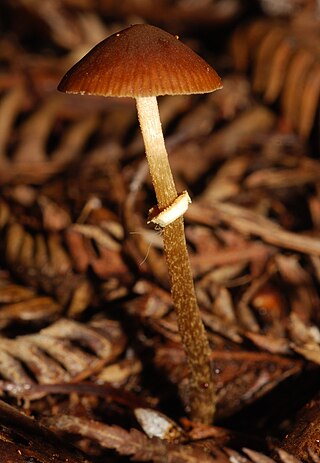Conocybe rugosa
Species of mushroom From Wikipedia, the free encyclopedia
Conocybe rugosa is a common and highly toxic species of mushroom that is widely distributed in Eurasia and North America.
| Conocybe rugosa | |
|---|---|
 | |
| Scientific classification | |
| Domain: | Eukaryota |
| Kingdom: | Fungi |
| Division: | Basidiomycota |
| Class: | Agaricomycetes |
| Order: | Agaricales |
| Family: | Bolbitiaceae |
| Genus: | Conocybe |
| Species: | C. rugosa |
| Binomial name | |
| Conocybe rugosa | |
| Synonyms[1] | |
| |
| Conocybe rugosa | |
|---|---|
| Gills on hymenium | |
| Cap is conical or flat | |
| Hymenium is adnexed | |
| Stipe has a ring | |
| Spore print is brown to reddish-brown | |
| Ecology is saprotrophic | |
| Edibility is deadly | |
Taxonomy
The species was originally described in the genus Pholiotina, and its morphology and a 2013 molecular phylogenetics study supported its continued classification there.[2]
Description
Conocybe rugosa has a conical cap that expands to flat, usually with an umbo. It is less than 3 cm across, has a smooth brown top, and the margin is often striate. The gills are rusty brown, close, and adnexed. The stalk is 2 mm thick and 1 to 6 cm long, smooth, and brown, with a prominent and movable ring. The spores are rusty brown, and it may be difficult to identify the species without a microscope.[3]
Habitat and distribution
The species grows in woodchips, flowerbeds and compost piles.[4][5] It has been found in Europe, Asia and North America.[4][5] It is especially common in the Pacific Northwest.
Toxicity
This species is deadly poisonous,[6] the fruiting bodies containing alpha-amanitin, a cyclic peptide that is highly toxic to the liver and is responsible for many deaths by poisoning from mushrooms in the genera Amanita and Lepiota. They are sometimes mistaken for species of the genus Psilocybe due to their similar-looking cap.
See also
References
Wikiwand - on
Seamless Wikipedia browsing. On steroids.
